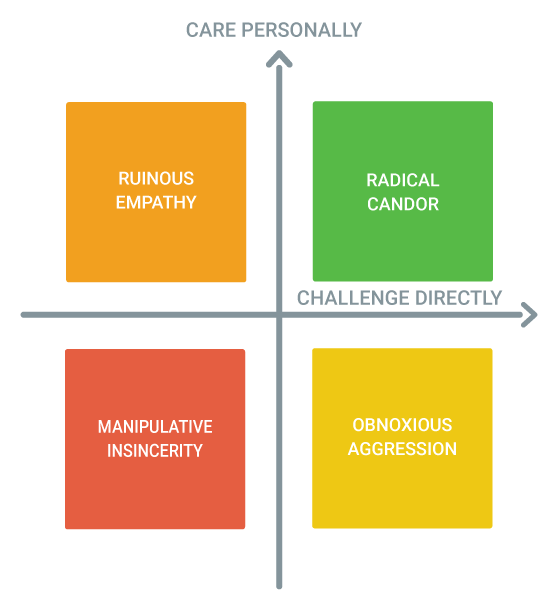Hey, can I give you some feedback?
How do you feel when you hear the words “Can I give you some feedback?” It probably depends on who it’s coming from, but if you’re like most people, your palms start to sweat, your heart races and you look for a place to hide. Let’s face it – feedback is a great idea in theory, but unless the person giving it is actually skilled at cultivating an environment to deliver powerful feedback, it can land with a thud and create a storm of unproductive emotions.
Feedback has emerged as a buzzword in American corporate culture. And, if you’re a manager, the concept of feedback probably dredges up another set of anxieties all together. It’s your JOB, after all, to provide feedback, right? As an HR professional, you have additional pressure to handle the situation with care, keeping in mind a goal with a productive outcome.
In Radical Candor, Kim Scott, (Apple University faculty member and renowned tech leadership coach) takes a no BS approach to revealing the keys behind delivering powerful, productive feedback that can actually strengthen the relationship: “Ultimately, bosses are responsible for results. They achieve these results not by doing all the work themselves but by guiding the people on their teams. Bosses guide a team to achieve results.”
Scott defines Radical Candor as feedback that comes from two basic principles:
- Care Personally; and
- Challenge Directly
Care Personally
This may seem like common sense, but start by creating genuine relationships with the people who work with and for you.
Relationships, not power, drive you forward. Your ability to build trusting, human connections with the people who report directly to you will determine the quality of everything that follows.
Kim Scott, Radical Candor Author
Scott says that caring personally needs to come from a place of authenticity and vulnerability – and it starts at the top: “Be more than ‘just professional’. It’s about giving a damn, sharing more than just your work self, and encouraging everyone who reports to you to do the same.“ She emphasizes the power of bringing your whole self to work. “Showing vulnerability, and even admitting when you’re having a bad day creates a safe space for others to do the same.”
It’s about giving a damn, sharing more than just your work self…
Kim Scott, Radical Candor Author
Challenge Directly
No beating around the bush here. “Tell people when their work isn’t good enough – and when it is.” For anyone who has had to deliver negative feedback, you know how tough this can be. Scott says to make it essential and leave out the clutter. “Challenging people directly takes real energy – not only from the people you’re challenging but from you as well. So, do it only for things that really matter.
It’s also important to lead by example. “Start by asking for criticism, not by giving it. Don’t dish it out before you show you can take it.”

Failing to follow the guidelines of Caring Personally and Challenging Directly can lead you away from Radical Candor and into some dangerous territory, according to Scott. She focuses on three distinct categories of unproductive feedback that we need to avoid:
- Ruinous Empathy
- Manipulative Insincerity
- Obnoxious Aggression
Ruinous Empathy. You know you need to deliver some crucial feedback – but you are so concerned with hurting the recipient’s feelings that you keep it to yourself. “You decide not to say anything because you’re thinking about your own feelings and reputation.” While choosing not to give challenging feedback might feel kind in the moment, ruinous empathy turns out to be selfish.
Manipulative Insincerity. This is the worst type of feedback, according to Scott. In this case, rather than deliver the feedback directly, you withhold it from the person it’s intended for, and instead talk about it with other people. Definitely not productive – and pretty cruel.
Obnoxious Aggression. Here is the category of feedback most of us fear – both hearing and delivering. The name speaks for itself. But how to avoid obnoxiously aggressive feedback? Scott says when delivering feedback that someone’s work isn’t good enough, it’s important to avoid personalizing it. Rather than saying “You’re sloppy”, she says, be clear that “your work is sloppy.” She also points out that for criticism to result in a positive outcome, it’s important to have a clear and specific message and articulate how the actions are negatively impacting the team or project. Then, get them back on track with a plan moving forward.
Kim Scott encourages us to be Radically Candid in all aspects of our work and life beyond the office walls: “Radically Candid management does take serious time, but it also leaves you time to pursue your own area of expertise and to deal with the unpredictable. Mostly, it requires you to be conscious, and to bring your full humanity to work with you.”
By being real, honest, and direct, you can start to introduce a culture of Radical Candor to your business.
To read more about Radical Candor, visit radicalcandor.com.
